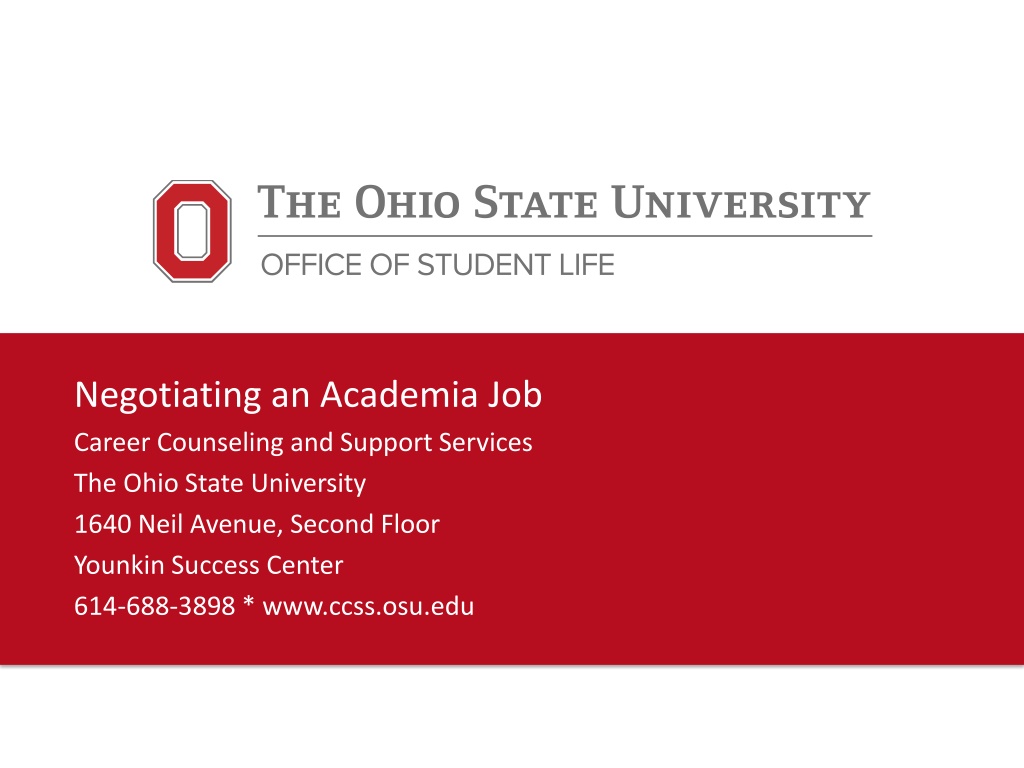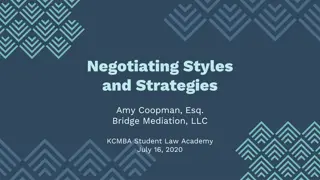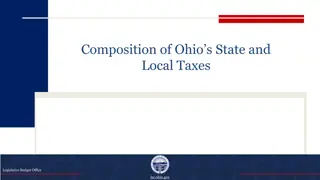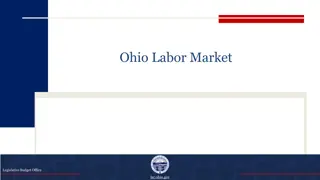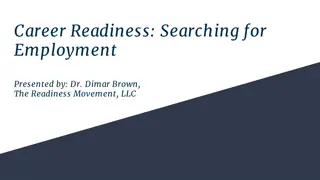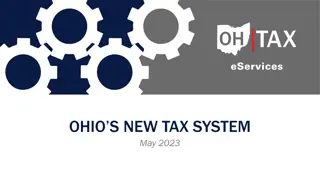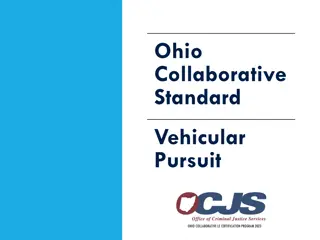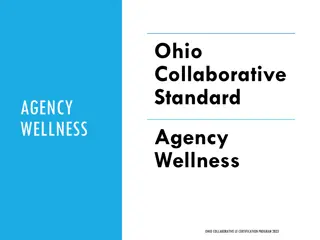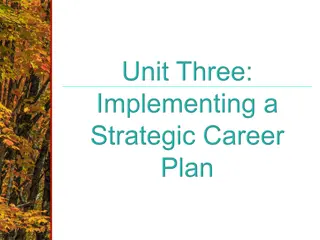Academic Job Negotiation Tips at Ohio State University
Career Counseling & Support Services at The Ohio State University provides valuable advice on negotiating academic job offers. Explore strategies for salary negotiation, handling questions about compensation during interviews, and learning about salary ranges for positions. Understand the nuances of negotiability in academia and discover steps to take if an offer is non-negotiable.
Uploaded on Oct 02, 2024 | 0 Views
Download Presentation

Please find below an Image/Link to download the presentation.
The content on the website is provided AS IS for your information and personal use only. It may not be sold, licensed, or shared on other websites without obtaining consent from the author. Download presentation by click this link. If you encounter any issues during the download, it is possible that the publisher has removed the file from their server.
E N D
Presentation Transcript
Negotiating an Academia Job Career Counseling and Support Services The Ohio State University 1640 Neil Avenue, Second Floor Younkin Success Center 614-688-3898 * www.ccss.osu.edu
Career Counseling & Support Services Agenda for Today Salary negotiation Other areas of negotiation Questions 2
Career Counseling & Support Services When to Negotiate? You are really not in a position to negotiate until the institution makes an offer 3
Career Counseling & Support Services How can I handle questions about salary during an interview? SCENARIO If asked: Do you have a salary in mind?" Tell the interviewer that you would prefer learning more about the current position before you discuss compensation, and that you are confident you will be able to reach a mutual agreement about salary at that time. 4
Career Counseling & Support Services Appropriate questions to ask if salary is brought during an interview What is the salary range for this position? Does the institution ever pay higher than the starting salary? If so in what circumstances? What is the average salary increase for the position? 5
Career Counseling & Support Services Are salaries really negotiable? Yes, and no. Department chair may have little discretion in some of these areas: salary, benefits, and housing Department chair has some flexibility in the use of department funds to cover for summer research conference funds extra TA(s) or RA(s) secretarial help lightened teaching loads Department chair has some control over computer access and office space lab facilities parking 6
Career Counseling & Support Services If offer is non-negotiable Some universities have a one price hiring process Best possible deal is calculated within current budget Most will discuss with you (if finalist) the package in depth, so that you know expectations before an offer is made Is transparent for candidates and candidates can withdraw 7
Career Counseling & Support Services if offer is negotiable After on-campus interviews, job candidate have been ranked and have gone to the dean and HR for backgrounds check Department chair calls you with an offer Job offer is usually made by phone, but sometimes e-mail Ok to say this isn t a good time to talk Institution makes an offer and goes into detail Make sure you can take notes Ask them to e-mail you the details after they ve gone through it all You can t always get what you want Cheryl Ball (insidehighered.com) 8
Career Counseling & Support Services The Negotiation Thank you so much for your offer. I m very pleased with the opportunity presented. Could you send your proposal on writing? I look forward to learning the details. I will be in touch after I study them. 9
Career Counseling & Support Services How is the Process? Yes, you have power! Don t let it go to your head and ask for the moon and stars Don t accept the job as-is because you are excited Show enthusiasm and appreciation. They will send an informal e-mail or HR will e-mail you a contract. This take days. The written contract is negotiable You have two weeks, generally speaking, to hash out details and give the college an answer Counter offer on phone or e-mail. Typically within 24 hrs. Your requests need to be reasonable and in line with the job ad and tenure expectations, type of university, and your credentials 10
Career Counseling & Support Services What do you need to know in order to negotiate? Negotiating must be done with a careful eye to: Size Type Rank of institution Size and rank of department Overall comparative wealth and endowment of the institution Its local culture (i.e unionized) Historical conditions of salary compression (offer cannot be higher than tenured colleagues who have been working for years with minimal or no raise) 11
Career Counseling & Support Services What do you need to know in order to negotiate? It will be a mistake to dictate to any department what a normal offer is or should be with regard to salary. AVOID: I d like to request a salary or XXXX which is in line with norms of the field, and reflective of the experience and potential I bring to the position Keep this in mind: Wealthy R1s and Ivy Leagues offer the greatest scope for negotiating; small regional teaching colleges the least room for maneuvering. Never attempt an R1 negotiation at a small regional college and vice versa. Well-connected advisors can assist you to assess appropriate scale of negotiating requests 12
Career Counseling & Support Services Rule of thumb . Ask yourself: How will you use what you gain through negotiations to do the work (and usually gain tenure) that this university is hiring you to do? If you can't answer that question, then you shouldn't be asking for it. 13
Career Counseling & Support Services The Negotiation In general ask for a 10% raise They will typically come back with less. How much less depends on the institution Relying on aggregate salary scales from the The Chronicle or the American Association of University Professors may do more harm. (no control for size, scales and endowments) Resist the craven urge to say any salary is fine, I m grateful just to have a job (all future institutional raises are calculated on initial salary) 14
Career Counseling & Support Services if Prepared Do not press on matters beyond their control, though you can certainly ask for some commitment to intervene with the responsible agency (i.e child care center, housing authority, spouse benefit) You can use any leverage you actually have: I really want to come here, but _____ has offered me x, y, and z. Is there anything you can do to assist me in making a commitment to you? How far you want to go? Depends on you, bluffing always carries risks Silence can be an effective tool, especially in face-to-face negotiations 15
Career Counseling & Support Services How can I handle questions about salary? SCENARIO If told: "The salary range for this position is $XXXX to $XXXX, is this what you were expecting?" Tell the interviewer that it does come near what you were expecting, and then offer a range which places the top of the employer's range into the bottom of your range (i.e., I was thinking in terms of $XXXX to $XXXX). Remember: be sure that the range you were thinking about is consistent with what you learned about that position in the institution. 16
Career Counseling & Support Services If offer is unacceptable I am very interesting in working for your institution; however, at this point I am not able to accept the offer because ___ (state specifically what is missing: is it the amount? Teaching load? Equipment? Travel requirements? I will be happy to accept this position if ______. Are you in the position to meet my request? Or if really want the job: What can I do to become more valuable? 17
Career Counseling & Support Services Areas of Negotiation The amount of time you ll have to decide on this offer Your starting date (including deferment in order to take a postdoc) Reduced teaching load (common for first year) Lab facilities and equipment Your own computer or easy computer access Money for new libraries resources (including files, slides, CD s) Summer research support Travel funds for conferences Early (or extended) sabbatical or leave (including parenting, if relevant) Early (or delayed) tenure review Extra T.A (s) or R.A (s) Extra secretarial assistance Office space/location Parking Moving Expenses Benefit package: health, life, disability, tuition, and retirement (available for spouse and dependents), on-site day-care, spouse employment assistance, pharmaceutical plan Assistance in finding and sometimes financing housing Assistance in finding spouse employment 18
Career Counseling & Support Services Negotiations Academic Jobs Look for mutual gain, common interests Chair is sympathetic to your need to publish, but has no money for course reductions this year. How about: More T.A.(s)? Less demanding courses? More summer research money? Reduction of administrative or departmental duties? Suppose you know you will not have time to prepare courses for fall (e.g. you ll be too busy finishing dissertation, or perhaps you are expecting a baby). Can you work out a semester s maternity leave? Find a substitute? Schedule all your courses or better a reduced load in the 2nd semester? 19
Career Counseling & Support Services Last thoughts Get offer on writing If you are not going to accept, explain why as tactfully and honestly Reiterate your positive impressions and your regret that the job didn t work out Write a follow-up letter as well 20
